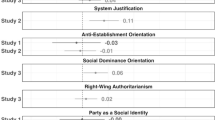We shall overcome,
We shall overcome,
We shall overcome someday.
If in our hearts we do believe,
We shall overcome someday.
Abstract
This article offers an invitational model for overcoming prejudices. The proposed model is based on Haberman's (1994) five-step approach to facing prejudices, which includes (1) analyzing prejudices; (2) seeking the sources of the beliefs; (3) examining the benefits of prejudice; (4) considering the effects of prejudices; and (5) planning to eliminate prejudices. Purkey's (1992) five-level conflict-management process adapted to prejudice serves as the five-part action plan in Haberman's fifth step. The combination of these two models yields an invitational approach with five parts: (1) perceiving concern, (2) conferring with oneself; (3) consulting with colleagues; (4) confronting the crisis; and (5) combating prejudices. Practical questions and examples are provided to clarify each step.
Similar content being viewed by others
References
Haberman, Martin (1987).Recruiting and Selecting Teachers for Urban Schools, New York: ERIC/CUE.
Haberman, Martin (1994). Gentle teaching in a violent society.Educational Horizons 72(3):
Hilliard, Asa G., III (1991). Do we have the will to educate all poor children?Educational Leadership 49(1): 31–36.
McIntosh, Peggy (1988).White Privilege and Male Privilege: A Personal Account of Coming to See Correspondences Through Work in Women's Studies. (Working Paper No. 89). Wellesley, MA: Wellesley College, Center for Research on Women. (ERIC Document Reproduction Service No. ED 335 262)
Meichenbaum, Donald (1985).Stress Inoculation Training. New York: Plenum Press.
Novak, John M. (ed.) (1992).Advancing Invitational Thinking. San Francisco: Caddo Gap Press.
Pine, Gerald J., and Hilliard, Asa G., III (1990). Rx for racism: Imperatives for America's schools.Phi Delta Kappan 71(8): 593–600.
Purkey, William W. (1992). Conflict resolution: An invitational approach.Journal of Invitational Theory and Practice 1(2): 111–116.
Purkey, William W. (1993). Climbing mad mountain: How to be inviting in challenging situations.Invitational Education Forum 14(2): 2.
Purkey, William W., and Novak, John M. (1984).Inviting School Success: A Self-Concept Approach to Teaching and Learning, 2nd ed. Belmont, CA: Wadsworth.
Reed, Charlotte (1992a). Enhancing self-esteem in multicultural classrooms.Invitational Education Forum 13(2): 8–10.
Reed, Charlotte. (1992b). Invitational and multicultural perspectives: What do they have in common? In John M. Novak (ed.),Advancing Invitational Thinking, pp. 47–75. San Francisco: Caddo Gap Press.
Stanley, Paula H. (1991).Asymmetry in Internal Dialogue, Core Assumptions, Valence of Self-Statements and Counselor Trainee Effectiveness. Unpublished doctoral dissertation, University of North Carolina at Greensboro.
Stanley, Paula H. (1992). Inviting things to do in the privacy of your own mind. In John M. Novak (ed.),Advancing Invitational Thinking, pp. 221–242. San Francisco: Caddo Gap Press.
Author information
Authors and Affiliations
Rights and permissions
About this article
Cite this article
Reed, C. Overcoming prejudices: An invitational approach. Urban Rev 28, 81–93 (1996). https://doi.org/10.1007/BF02354379
Issue Date:
DOI: https://doi.org/10.1007/BF02354379




